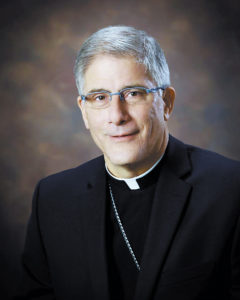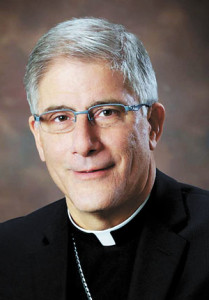
Bishop Joseph R. Kopacz
By Bishop Joseph Kopacz
The proclamation from the Gospel of Mark of the healing of the man who suffered from deafness and an accompanying speech impediment, the one proclaimed on Sunday, Sept. 9, reveals the mission of the Lord Jesus and of the Church. “The Word became flesh and dwells among us.” (Prologue of Saint John’s Gospel) In this unique miracle, the humanity and divinity of Jesus shine forth. In summary, Jesus responded to the plea of the raucous crowd by going apart with the man to accomplish the cure. Jesus touched his ears, and spitting, touched his tongue and looking up to heaven he groaned and said, “be opened.” In that moment heaven and earth were in harmony and the physical healing led to praise and gratitude that could not be silenced.
From the beginning, the mission of the Church, with the mind and heart of Jesus Christ and in the power of the Holy Spirit, brought his saving message to all who had ears to hear. From the letter of Saint James, also from last weekend’s scripture, we hear that divisions emerged at the outset in the fledging Christian community. The rich were given first class treatment and the poor were left to stand on the margins of the gathered community. Immediately the Spirit of God convicted and enlightened the disciples to change their manner of thinking and acting. By virtue of the saving blood of the Lord who unites those who are far off and those who are near (Ephesians), all of the baptized have equal dignity around the table of the Lord, rich and poor, Jew and Greek, male and female, slave and free. (Galatians)
The early Christians learned quickly in Jerusalem when we recall in the Acts of the Apostles that the order of deacons was established for Diakonia, loving service, to meet the growing needs of the Jerusalem community. The action of the Lord at the Last Supper when he washed his disciples feet fostered the vision for the early Christians who cared for one another in a manner totally unheard of in the Roman Empire. In contrast to the brutal culture of the first century, Christianity and the first Christians were warm, inviting, kind and generous, and early Christian culture was deeply personal. They extended the saving and healing touch of the Lord without cost to many on the margins of society.
Word, worship, community and service marked these early Christians, and indeed, ears were opened to hear the saving Word, and mouths followed in praise, and hands in loving service. Over time, the deacons were entrusted with the administration of the Church’s material resources, and the rapacious Roman Empire thought that they could enrich their coffers by confiscating the property and wealth of the Christians. In the middle of the third century, Deacon Lawrence, who in his martyrdom became the patron of Rome, was ordered to cough up the Church’s wealth to the governor. He gathered up the poor, the lame, the blind the leprous, etc. and paraded them before the governor announcing that these are the Church’s wealth and fortune. Not amused, they martyred Lawrence over a hot coals. In creative ways in different times and in worldwide settings, the Church has embodied the mission of Jesus Christ to touch the world with healing, hope and new life in the Kingdom of God.
On Friday evening, Sep. 7, Jim Caveizel made a cameo appearance in Jackson on behalf of Catholic Charities and inspired all with his deep commitment to the Lord and his Catholic faith. He began his presentation with a clip from Mother Teresa’s acceptance speech for the Nobel Peace Prize in 1977. The cornerstone of her inspiring speech was that there will never be peace as long as abortion ravages life in the womb. That made more than a few in the audience uncomfortable on that occasion but she was unapologetic about the dignity of life at all stages. She captured the imagination of the whole world when she went into the filth and squalor of the worst neighborhoods of Calcutta, India. Each day she woke up, she worked with the forgotten ones, the poorest of the poor, the HIV victims, and cared for them as if there were Jesus himself.
From this intro, Jim Caveizel affirmed the work of Catholic Charities as a living and breathing example of what it means to belong to Jesus Christ and to embrace his mission. Hearing and following the call of the Lord, Caveizel noted, can come at great cost, but what good is it to gain the whole world and to lose one’s soul. When the Lord touches us, we understand the closing verses of last Sunday’s Scripture from the letter of James, “we are called to be rich in faith, heirs of the Kingdom, that God promised to those who love him.”
During these days of anguish for many victims of sexual abuse and their families, and for those who love the Church, may our groaning prayers directed to heaven, and our actions of loving service, open the hearts and minds of all who are suffer with the Lord’s healing, hope and peace.


